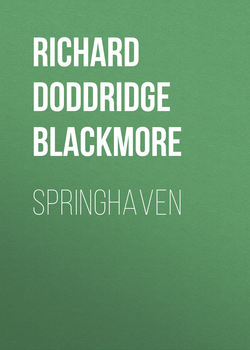Читать книгу Springhaven - R. D. Blackmore, Richard Doddridge Blackmore - Страница 21
CHAPTER XXI
A GRACIOUS MERCY
ОглавлениеAs a matter of course, every gunner at the fort was ready to make oath by every colour of the rainbow, that never shot, shell, wad, sponge, or even powder-flake could by any possibility have fallen on the beach. And before they had time to grow much more than doubly positive—that is to say, within three days’ time—the sound of guns fired in earnest drowned all questions of bad practice.
For the following Sunday beheld Springhaven in a state of excitement beyond the memory of the very oldest inhabitant, or the imagination of the youngest. Excitement is a crop that, to be large, must grow—though it thrives all the better without much root—and in this particular field it began to grow before noon of Saturday. For the men who were too old to go to sea, and the boys who were too young, and the women who were never of the proper age, all these kept looking from the best lookouts, but nothing could they see to enable them to say when the kettle, or the frying-pan, or gridiron, would be wanted. They rubbed their eyes grievously, and spun round three times, if time had brought or left them the power so to spin; and they pulled an Irish halfpenny, with the harp on, from their pockets, and moistened it with saliva—which in English means spat on it—and then threw it into the pocket on the other side of body. But none of these accredited appeals to heaven put a speck upon the sea where the boats ought to have been, or cast upon the clouds a shade of any sail approaching. Uneasily wondering, the grannies, wives, and little ones went home, when the nightfall quenched all eyesight, and told one another ancient tales of woe.
Yet there is a salve for every sore, a bung for every bunghole. Upon the Sunday morning, when the tide was coming in, and a golden haze hung upon the peaceful sea, and the seven bells of the old grey church were speaking of the service cheerfully, suddenly a deep boom moved the bosom of distance, and palpitated all along the shore. Six or seven hale old gaffers (not too stiff to walk, with the help of a staff, a little further than the rest) were coming to hear parson by the path below the warren, where a smack of salt would season them for doctrine. They knew from long experience, the grandmother of science, that the mist of the sea, coming on at breakfast-time, in the month of August (with the wind where it was and the tides as they were), would be sure to hold fast until dinner-time. Else, good as they were, and preparing punctually once a week for a better world, the hind buttons of their Sunday coats would have been towards the church, and the front ones to the headland. For the bodies of their sons were dearer to them, substantially dearer, than their own old souls.
They were all beginning to be deaf, or rather going on with it very agreeably, losing thereby a great deal of disturbance, and gaining great room for reflection. And now when the sound of a gun from the sea hung shaking in the web of vapour, each of these wise men gazed steadfastly at the rest, to see his own conclusion reflected, or concluded. A gun it was indeed—a big well-shotted gun, and no deafness could throw any doubt on it. There might not be anything to see, but still there would be plenty to hear at the headland—a sound more arousing than the parson’s voice, a roar beyond that of all the gallery. “‘Tis a battle!” said one, and his neighbour cried, “A rare one!” They turned to the parish church the quarters of farewell, and those of salutation to the battle out at sea.
It was all over the village, in the time it takes to put a hat on, that the British and the French fleets were hammer and tongs at it, within the distance you may throw an apple off Springhaven headland.
Even the young women knew that this was quite impossible, because there was no water there for a collier-brig to anchor; nevertheless, in the hurry and scare, the thoughts of that new battery and Lord Nelson, and above all in the fog, they believed it. So that there was scarcely any room to stand, at the Watch-point, inside the Shag-rock; while in church there was no one who could help being there, by force of holy office, or example.
These latter were not in a devout frame of mind, and (but for the look of it) would have done more good by joining the other congregation. For the sound of cannon-shot came into their ears, like balls of unadulterated pepper, and every report made them look at one another, and whisper—“Ah! there goes some poor fellow’s head.” For the sacred building was constructed so that the sounds outside of it had more power than the good things offered in the inside.
